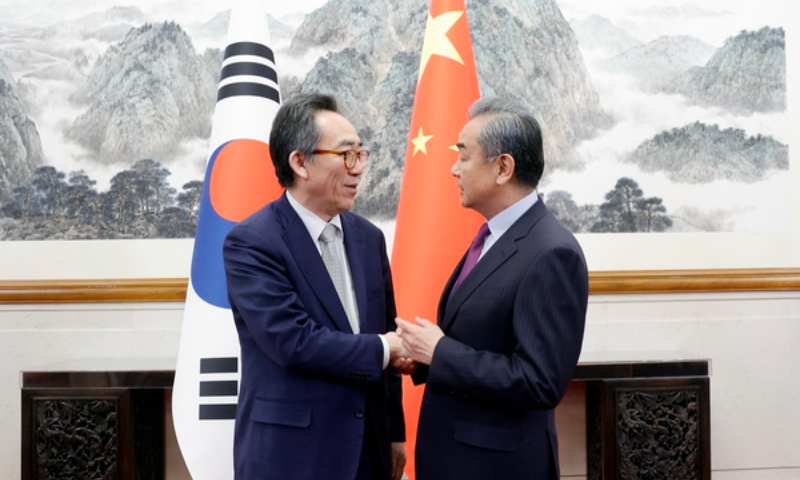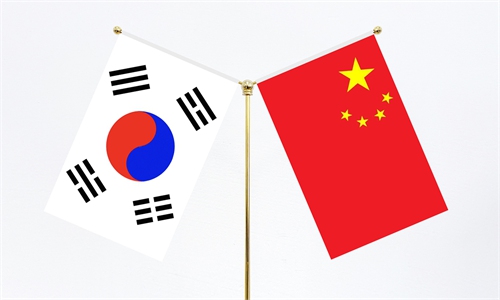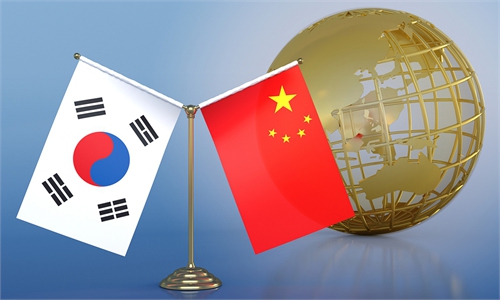South Korean FM's visit to China hoped to foster more positive steps: Global Times editorial

Chinese Foreign Minister Wang Yi (right) meets with visiting South Korean Foreign Minister Cho Tae-yul in Beijing on May 13. Photo: fmprc.gov.cn
On May 13, Member of the Political Bureau of the CPC Central Committee and Minister of Foreign Affairs Wang Yi held a meeting with visiting South Korean Foreign Minister Cho Tae-yul in Beijing. Wang said that in the more than 30 years since the establishment of diplomatic relations, the overall development of the relationship between the two countries has been smooth and fruitful. He noted that recently, China-South Korea relations have been facing difficulties and challenges, which is not in the common interests of both sides, nor is it what China wants to see. He also expressed hope that the South Korean side and the Chinese side will work together to stick to the original intention of establishing diplomatic ties, adhere to the direction of good neighborliness and friendship, stick to the goal of mutually beneficial cooperation, remove disturbances, and make joint efforts to push for the sound and steady development of China-South Korea relations.
Cho said that it is hoped that this visit will become an important step forward in South Korea-China relations. He pointed out that South Korea doesn't perceive foreign relations as a zero-sum relationship, and it has been cooperating with other nations in a balanced manner. He said South Korea is willing to enhance mutual trust, expand consensus and focus on cooperation with China, thus avoiding geopolitical constraints as much as possible and jointly opening up a new situation of bilateral cooperation.
Cho's statement of "taking the first step to create new momentum for South Korea-China ties" has been directly taken as headlines by major South Korean media outlets. His words and actions in China have also sparked a significant amount of analysis and interpretation. On one hand, this visit is the South Korean foreign minister's first visit during his term, and the high level of attention itself reflects the abnormal state of current China-South Korea relations while also carrying the expectations of the people of both countries for a quick return to normalcy in bilateral relations. On the other hand, Cho's statements have formed a contrast with the South Korean side's actual policy of "pro-American and distancing from China" in the recent period, conveying a signal of hope for adjusting and improving China-South Korea relations.
The South Korean foreign minister's visit to China and the related statements signify a positive step forward in South Korea's diplomacy toward China. In fact, prior to this, there was a high public opinion in South Korea hoping to quickly handle relations with China and maintain a "minimum balance." At the economic and trade and cultural exchange levels between the two countries, various dialogues and interactions continue to resume. Not to mention the Zhangjiajie tourism boom driven by the influx of South Korean tourists and the emotional ripples among the people of both countries stirred by the giant panda Fu Bao. Therefore, it's fair to say Cho's visit conforms to the fundamentals of bilateral relations.
There is no need to hide the fact that in the past period of time, the development of China-South Korea relations has not been satisfactory. Some people have said that "there are many unresolved issues between China and South Korea that have piled up like a mountain," and this visit will also involve some thorny issues. In this situation, it is important to clarify why communication and dialogue, as well as the starting point of both sides, are crucial. First, the ups and downs of China-South Korea relations in the past should make both sides, especially the South Korean side, clearer that there is no fundamental conflict of interests between the two countries, nor is there any strategic competition. On the contrary, there are many inseparable interdependencies and internal dynamics. Second, stabilizing and developing China-South Korea relations is in line with the common interests of both countries, as well as the expectations of the two countries' vast populations and business communities. Third, China-South Korea relations should not be disrupted or influenced by third-party factors. Both sides should abide by the principles of independence, mutual respect, and mutual benefit in order to maintain a stable and long-lasting bilateral relationship.
It is important for both countries to take a positive step in high-level exchanges and create a stable expectation for China-South Korea relations. It is also important to cultivate a rational attitude toward each other and create a good atmosphere for bilateral relations. For example, in the industrial field, there is some objective competition between China and South Korea, but this is not the mainstream of China-South Korea economic and trade relations, nor does it mean that the two countries are going to become hostile. The scale of economic and trade cooperation between China and South Korea is large, with strong complementarity, and there is still huge potential to be tapped.
As representatives of South Korean companies in a dialogue with the South Korean Foreign Minister said on May 13, the Chinese market has benefited both countries' economies in the past 30 years, and it is believed that in the next 30 years, both sides can also develop a win-win strategy. There is no need for China and South Korea to fall into the self-fulfilling prophecy of competition, even hostility.
Next, there will be a series of diplomatic dialogues and interactions between China and South Korea, including the ongoing coordination of the China-Japan-South Korea trilateral meeting. For both China and South Korea, especially for the people of both countries, what is anticipated is not just a restoration of exchanges in forms, but also the development of substantive content. This is something we all see very clearly. We hope that the positive step taken by the South Korean foreign minister's visit to China can bring about more positive steps from the South Korean side, and South Korea will work together with China to promote the healthy and stable development of bilateral relations.


